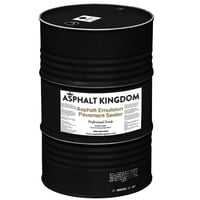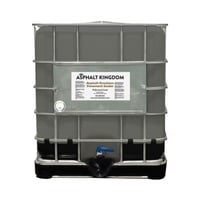GET THE BEST DRIVEWAY SEALER TO PROTECT YOUR INVESTMENT
Your Asphalt Will Look Great and Last Longer!
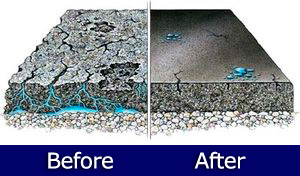 Commercial grade asphalt sealer is the single most important item to buy for professional sealcoating results.
Commercial grade asphalt sealer is the single most important item to buy for professional sealcoating results.
This is true for everyone, whether you are a homeowner who wants to sealcoat your own driveway or you're a grizzled pro who's has been in this business for a decade.
No matter what asphalt crack sealing equipment you use, you must buy the best driveway sealer to do the job right.

Table of Contents
How To Choose The Best Driveway Sealer
Check out our store for commercial-grade sealers, as well as sealers made for contractors.
|
For Commercial:
|
For Contractors:
|
|
See All Driveway Sealers |
||
Asphalt emulsion sealer is a petroleum-based substance that is used to protect the pavement from moisture and deterioration.
This substance consists of asphalt emulsified in water, so this is basically the same material used in your driveway.
Once it is applied to the pavement, water quickly evaporates while the asphalt clings to the surface.
Pros
- Good water resistance property
- It has a beautiful black color once dry
- Better for your health and the environment
- More flexible and doesn't become brittle easily
- DIY friendly
Cons
- Poor UV resistance
- Fades quickly
You will also find other suppliers selling coal tar sealer online. This type of sealer has a high gloss finish and is extremely durable.
But this beauty comes at a price. It contains toxins that are harmful to us and to the environment. Because of this, Asphalt Kingdom is no longer selling coal tar sealer.
Need help with your parking lot or driveway repairs?
We'll call or e-mail you with advice on what equipment and supplies you'll need for your repairs! Just fill out our easy-to-use form for a parking lot assessment to get started!
Here some things you should consider when choosing the right type of asphalt sealer:
Do you need greater water and UV resistance? Or do you live in temperate climes and you're fine with an asphalt sealer that provides moderate protection?
Do you want a darker surface or are you fine with a dark gray color?
Do you want something more environmentally friendly?
Consider the advantages and downsides of each sealer type and brand to see which one is ideal for your application.
Why It's Important to Get the Right Amount of Asphalt Sealer For Your Project
You've finally decided to buy asphalt sealer, but there's something you need to know.
Having the right amount of blacktop sealer on hand for your sealcoating job is crucial. You always want to finish the asphalt sealcoat in one go, and not run out part way through.
The last thing you want is to stop and wait to get more asphalt sealer! This could affect how seamless the sealcoat looks, and you could end up with 2 different colors of black.
So how do you get the right amount of sealer? Read our easy-to-follow guide below.
- Measure the area you're going to sealcoat
To get the square footage of your driveway, simply multiply length times width. For odd shapes, like an L, calculate two rectangles, and add the 2 together. - Read the sealcoating label
The label contains information on how many square feet a gallon of asphalt sealcoat will cover. Then you’ll know how many gallons you need to order the right amount of sealer for asphalt. - Think ahead!
A smooth surface will use less blacktop sealer than a rough driveway. How thick you spread the sealcoating will be another important factor. This can affect by as much as 30 square feet per gallon, so take this into account! - Use An Online Calculator
This sealcoat calculator can help professional sealcoaters get all the variables taken into account in one step.
Don’t end up caught short and run out of asphalt sealer in the middle of your sealcoating job. Take the time to measure, read the asphalt sealcoat label, and calculate to get the right amount of asphalt sealer.
Sign Up for our Free Property Manager's Email Course
For Property Owners: Hire a Pro or Do It Yourself?
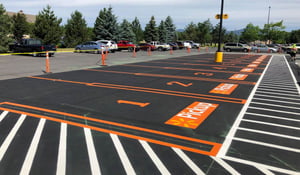 Pavement sealer protects your parking lot from damage caused by UV rays and moisture. It also keeps your property looking fantastic. The real question is what is the best way to get the job done? Is it smarter to invest in sealing equipment or hire a sealcoating pro?
Pavement sealer protects your parking lot from damage caused by UV rays and moisture. It also keeps your property looking fantastic. The real question is what is the best way to get the job done? Is it smarter to invest in sealing equipment or hire a sealcoating pro?
You need to know the pros and cons before you can make the choice of who will maintain your parking lot.
Benefits Of Hiring A Pro
- Zero investment cost – No need to find room in your budget for equipment and supply costs
- Frees your time – Compared to doing it yourself, you only need to spend the time hiring and checking the work
- Work gets done faster – Professionals can zip through the work much faster than you can ever learn to do
Advantages of DIY Sealcoating
- Investment cost write-off – Equipment is a capital expense and has tax benefits. (Note: sealing is a bi-yearly task, so you’re better off buying than renting the machines)
- Ease of scheduling – You have the control over when to maintain your parking lot when it suits your car park needs
- Save money – Doing it yourself is definitely cheaper
Those are your basic pros for both sides, and yet they do not help to make the decision easier. We need to go a bit more in-depth on the biggest issue of how you maintain your parking lot.
The #1 Issue: You need your car park for parking
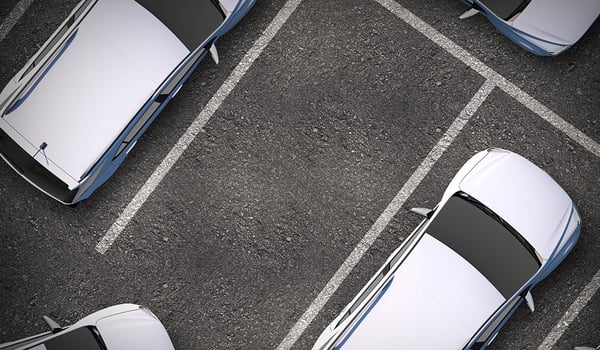
Applying driveway sealant requires keeping everything and everyone out of the area. This applies to each stage of asphalt maintenance: cleaning, crack repair, sealcoating, curing, and line striping.
Unfortunately, that can put your parking spaces out of commission for days! To save time, many property owners opt to skip on some steps altogether. But that's not the way to maintain your parking lot.
The best way to do it? We recommend that you do it in stages. You can do this either by working one section at a time. You can also complete the steps in stages when the area is not in use (overnight, weekends, holidays, etc.).
This is exactly where hiring a contractor becomes helpful or not. Can you find a sealcoating firm that is willing to work with you on timing? If their answer is to skip filling all of the cracks or that their schedule doesn’t permit splitting the time up, you have your answer.
Pavement sealer is only as good as the care that goes before, during, and after. Any company that is willing to work with you is certainly a pro, and not a con.
The Big Question: Can You Maintain Your Parking Lot Yourself?

Asphalt maintenance is not a hard-to-learn job, nor does it need a ton of training. Sealcoating, and all the jobs that come before and after, are as simple as learning how to use a lawn mower. Still not sure? Take our free property manager’s course and decide from there if it’s for you.
There are always pros and cons to any decision. Do it yourself or hire a contractor? Maintaining your parking lot is an easy choice once you know the issues.
Protecting the capital investment of your property’s car park is smart. You keep your business looking great and you prevent dangerous cracks and damage.
Closing off your parking area to do the work is the biggest issue you need to face and address. Doing it in stages or in sections will help keep your business running smoothly.
You can hire a pro that’s willing to work with you. Or you can easily learn to apply sealer yourself, whichever works best for you.
How do we know you can do it? We’ve helped a ton of businesses with their pavement sealer questions and here’s what they have to say.
We also recommend using this convenient Sealcoat Calculator to get exactly the right amount of sealer every time!
Free Asphalt Course
You can take our FREE AKPRO 4 day email asphalt maintenance course and learn all about maintaining asphalt surfaces. You'll be an expert in no time.
Some of the things you will learn in the course include
- Preparing the driveway for treatment (sweeping, blowing, washing, edge trimming, etc.)
- Filling the cracks in the asphalt surface and find out what the best crackfill products are.
- Sealing the driveway and what asphalt sealers are best to use.
- What to do once the job is completed. Enjoyed sealing your asphalt? Here's an exciting and lucrative opportunity for you. You can seal other people's driveways and earn $500 in profit daily!
It can become a full time thing or a weekend thing. Starting your own sealcoating business with the help of Asphalt Kingdom can be extremely profitable.
Dos and Don’ts of Using Asphalt Pavement Sealer
Just like any DIY project, pavement sealing has rules you will have to follow if you want a professional-looking result. If you are keen on sealing your own driveway, then check out some dos and don’ts listed below.
Remember that a DIY project gone bad is more costly than if you were to hire a professional or contractor in the first place. Aside from the expenses of the DIY project gone wrong, you’d have to pay extra for the pro to correct any damage you might have done.
Before applying pavement sealer on your pavement, DO patch any holes and seal any crack. Applying sealer without filling these cracks and holes will only make these crevices susceptible to more damage.
Asphalt Kingdom has both cold pour and hot pour asphalt crack filler varieties that should be used first. Moreover, DO check to make sure that these fillers have substantially hardened from the inside out before any sealer is applied.
DO fill the sides of your driveway with soil. The edges of an asphalt driveway are very susceptible to damage if they are not supported. After applying pavement sealer, place an inch thick of sandy loam soil in the edges, so that any heavy vehicle that will be driving close to the edge of the driveway will not be able to start a web of small cracks that get aggravated in time.
DO use a weed killer to stop weeds from springing up every time a small crack forms in the asphalt’s surface. Weed killers are readily available in garden stores, and we recommend that you apply them every season change. Without weeds threatening to spring up too often, the strength of the sealer is intact.
When applying pavement sealer, DO wait at least 6 hours after putting the first sealer coat to apply the second coat. Applying a second coat before the first coat has fully dried makes both coats useless. If the outside temperature is cool then shady areas, high humidity, and cloudy conditions may prolong the drying process.
Moreover, DO apply thin coats that can be repeated twice for more even results. One thick coat usually results in longer drying time and an uneven finish.
DON’T use the sealer immediately after applying the sealer. After making sure that the last coat of sealer has dried, allow 12 more hours for it to set in and cure before vehicles can go over it. Freshly sealed pavement, even when it already “appears” dry, can still leave behind tire marks or indentations.
DON’T let newly sealed driveways be stained with gas and oil leaks. It would be best to cover the driveway with cardboard during the first few days that the newly sealed driveway will be used again. It would be better for you to have any vehicle leaks repaired, as a pavement sealer can only do so much.
How to Keep The Edges Clean
Ken asked us a very common question about sealcoat edging:
Hello Everyone,
I am new to the business and thought you might share some tips with me on the proper cutting in techniques you employ. Below is a list of problems I am encountering and wondering if you can help us out?
1) Backerboard works great if it is backed up to a wall, or in a crack. However if the backer board sits flush on the asphalt the sealer will blow right under the board and leave 2-4 inches of sealer on the sidewalk.
2) A very common drive we are encountering are ones with new asphalt (flush with the sidewalk) or patterned interlocking bricks (flush with the asphalt) Backer board doesn’t leave a clean line, so do you tape the sidewalks or paving stones prior to spraying? Are you taping and using a squeegee on the edges?
3) Do you use a combination of masking tape and Kraft paper to mask off curbs, paving stones, sidewalks etc.?
We have tried and can do a line of sealer with the sprayer with the backer board however if the backer board sits flush on the asphalt it blows under it leaving a very poor line.
Any help would be appreciated,
Thanks,
Ken
For edging, there are a few things you can do.
First, you can tape the parts that you don't want to get sealer on, and use a backerboard as well.
Another thing you can do is use a broom or brush and a 5 gallon pail of sealer to cut in the edges.
The most important thing to do when using a sprayer is to use the correct spray tip. The 2 GPM size lets you do edges without a lot of overspray, so you can use a 2 GPM tip for the edges, then do a quick switch to the 3 GPM or 4 GPM for large parking lots.
Thank you for reading our guide to the best asphalt driveway sealers. Have a question of your own? Call us at 1-866-399-5562 for free expert advice or contact us online.
Other pages that might interest you:
- Seal Asphalt and Repair Cracks In Asphalt To Extend Its Life
- Removing Stains From Any Asphalt Surface
- Asphalt Patching and Pothole Repair
